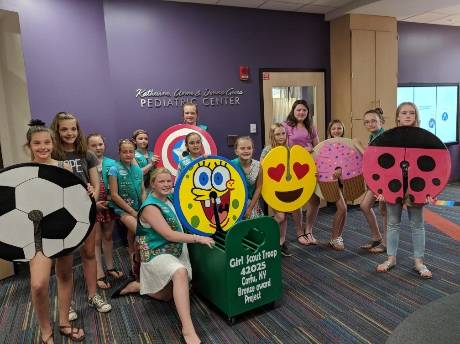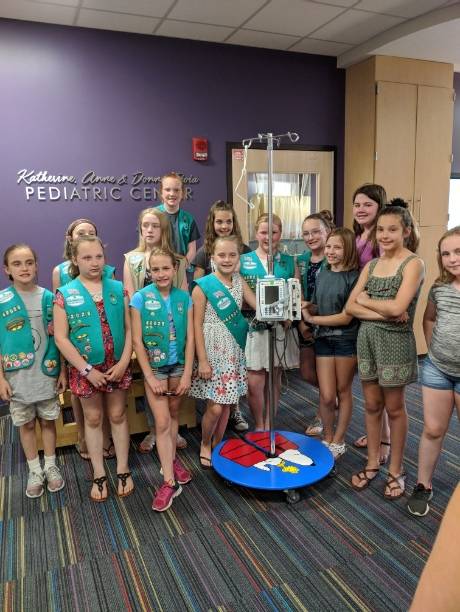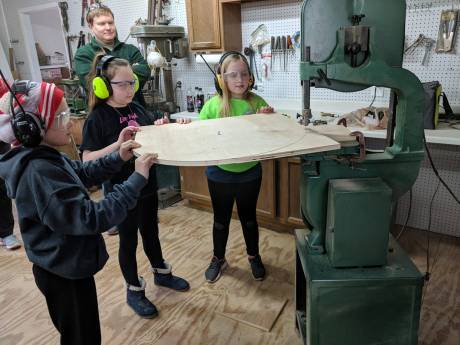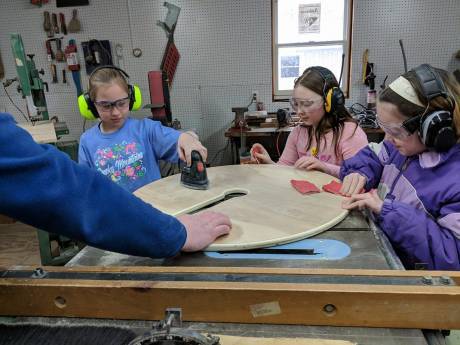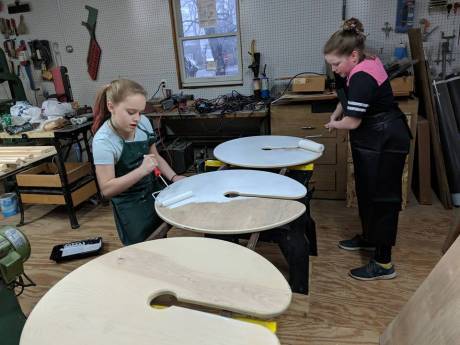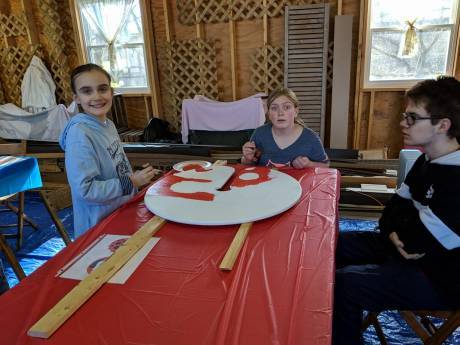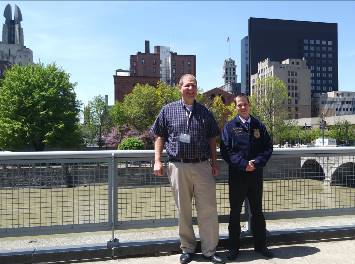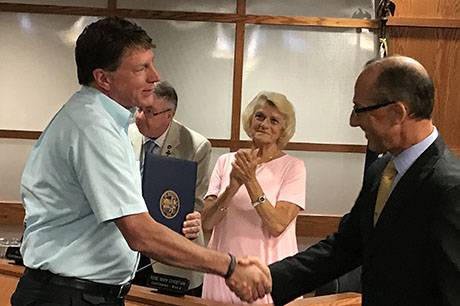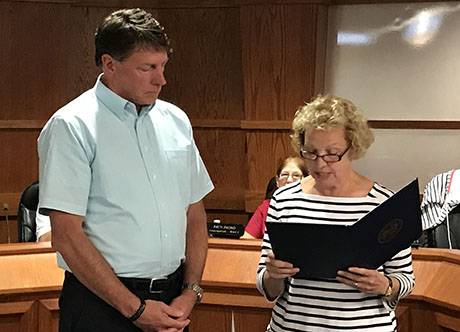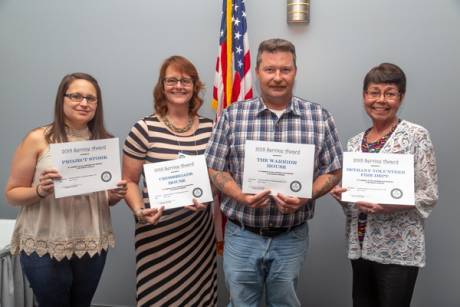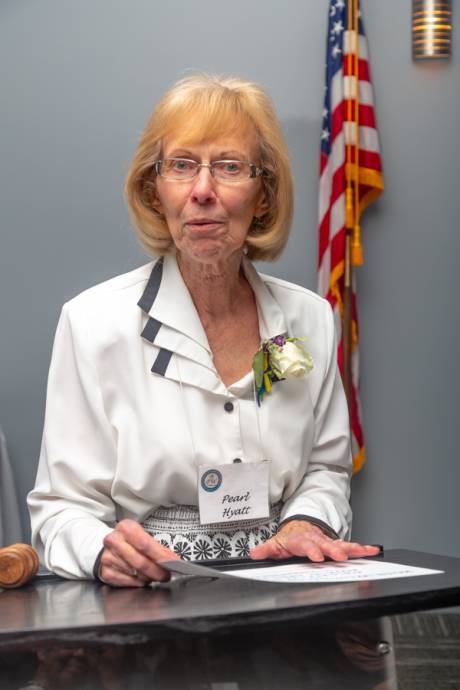This is a transcript of an interview conducted with Catherine Huber, Ed.D., superintendent of the Alexander Central School District, on May 15. It's taken us some time to prepare the transcript for publication. It's been lightly edited for clarity.
The interview came about following publication of a story published April 25, Group of Alexander parents express frustration at how the school is handling discipline, student safety. Shortly after publication, the attorney for ACSD, Jennifer Schwartzott, e-mailed The Batavian and demanded a retraction. The Batavian did not retract the story, and the school district eventually dropped its demand for a retraction and agreed to an interview with Huber.
Context for the interview also includes the stories: Five school districts in Genesee County restrict speech for board members and NYSSBA deputy director addresses confusion about free speech rights of school board members.
Huber became superintendent of Alexander in December 2016.
THE BATAVIAN: We've heard from several parents, especially after our story a few weeks ago, who express frustration with the school district. They feel they are not being heard and they're powerless. This is more than just a few disgruntled parents. Why is this so pervasive? How did it become this way, and what changes are you making sure the parents are empowered?
CATHERINE HUBER: I just want to respond to that we listen to all concerns, questions that are brought to our attention. When I say we, I mean me, I mean teachers, building administrators, and our Board of Education. We deal with every situation that's brought to our attention and while sometimes there might not seem to be a resolution or might not be a resolution that people have all the details about does not mean that we're not responding.
TB: Is there anything you need to review that parents aren't getting -- how can you help parents feel more empowered, that they are being listened to?
CH: Do you have a specific situation that you --.
TB: Well, we're not supposed to discuss specific situations --.
CH: Correct.
TB: And, you know, there was the parents with the two meetings that had come up and then after a story posted we got so much feedback and social media emailed to me of like, "right on, finally somebody standing up for us." So, there is definitely a feeling out there that parents don't feel empowered and don't feel like they're being listened to. So, I'm wondering if there is a self-reflection of anything, anything you can do differently?
CH: I can assure you that we're always reviewing our processes and reflecting on how we conduct our business.
TB: Does it concern you to have this pop up like this?
CH: So, one of the things that is so fantastic about Alexander is that this school is the heart of the community and there is nothing like this community. This community loves its schools and there are so many outstanding things that are happening in this school every day. We have students who are successful on the stage, on the field, academically. We have community members, faculty, and staff who are engaged in all sorts of processes around the school all to make sure that people know that they have a voice in this school.
CH: One of the things that I'm most proud of, and I know that you were privy to some of this during your budget presentation last week, is that we've set up a whole system of committees. They are open to anybody -- community members, faculty, staff. We have student representatives on our committees. Some of the committees that we're working on right now, we have a capital project committee, we have members of our community, We have people from our transportation department, our administrators, our teachers, our staff, we have a student representative, who are not only talking about what we're going to be doing moving forward with our next project -- and I think you walked in through our last project, our beautiful new foyer -- but we're also talking about what's our vision for what Alexander will be in the next five or 10 years and then how our facilities can match up with that.
CH: We have community members and faculty and staff and students involved and all our hiring committees so we're about to start hiring for two of our retirements and those committees are important things that we're doing. We have our safety committee that has community members on it as well. We have a wellness committee. Again, representatives from across our community. Tim and I actually once a month meet with the mayor and the town supervisor in Alexander, again, as an opportunity to reach out to the community and to make sure that we always stay focused on the fact that this school is the heart of the community.
CH: That's what I want us to be focusing on. Our practices and the way that we communicate, the way that we are available -- those are all things that as any good professional will do. We're reflecting on all the time but what I'd really love to do is to get back to the conversation about all the great things that are happening at Alexander.
TB: I appreciate that. If there is any parent out there who feels that they haven't been heard, what would you encourage them to do?
CH: I would encourage them to follow the chain of command and the chain of command would be that you start with the classroom teacher. You move to the building administrator. If you still don't feel satisfied, you would move to the superintendent. And then, as appropriate, I could refer that to the Board of Education. That's in our policy.
CH: Being heard is not the same necessarily as getting the answer that you expect. We all know that. But I can assure you that parents are heard. Community members are heard when they reach out.
TB: Moving on, why should the board speak with one voice?
CH: The board should speak with one voice for several different reasons. The board by policy designates a spokesperson for the school district. We have that policy for you and I know that you've gathered those policies from other school districts as well and the board by policy has designated the superintendent as the spokesperson. Our board has also gone a step further. Recently we did a board retreat and the board established norms, which you also probably saw on our website, and one of the norms that the board established was that they would speak with one voice. They would speak with one voice on matters related to the school district. Board members individually don't have power on their own. They have power and they come together around the board table. That is not the same as their inability to express an opinion. Anybody has the ability to express an opinion. But in terms of commenting on district business, the board members only can speak with that same one voice as a board and not as individuals and they've designated the superintendent, as they probably have in most school districts, as the spokesperson for the district.
TB: Before this whole issue came up, I never, in 30 years of journalism come across agencies that said we must speak as one voice, that individual people are not their own independent agents who are responsible to their constituents. What you describe sounds like the kind of thing we would expect in Communist China where we all must be on the same page, people aren't allowed to dissent.
CH: You have the policies and I know you have the policies from the other school districts as well.
TB: Do your members have a right to dissent?
CH: Absolutely, they do.
TB: So why are they not allowed to speak those opinions if asked?
JENNIFER SCHWARTZOTT: That isn't what she said. She didn't say --
TB: I'm asking this, this because this has been my experience. Nobody can speak their opinions individually, from my experience in dealing with this school district. So I don't know, why that is?
CH: Can you maybe use a different word than allowed? Where are you finding that nobody can speak?
TB: That's comes from your statements and her statements to me.
JS: That is certainly not my statements as we've -- I'm not part of this interview, so if you want to ask Dr. Huber what her statements are you certainly can but she can't speak for me --
(NOTE: Since this interview, The Batavian has twice emailed Schwartzott offering her an opportunity to clarify her position. She hasn't acknowledged the emails.)
TB: When the first time I tried to talk to you the clear message as we speak with only one voice.
CH: Correct.
TB: Which is negating dissent or individuals’ views.
CH: It's in keeping with our policy. An important thing to keep in mind, too, is that one of the central jobs of a Board of Education is that they get to approve a policy. So, Boards of Education approve the policy that talks about things like who is the spokesperson for the board.
Continued after the jump (click "read more" below or the headline):
TB: Moving on. This gets to some Special Ed stuff. So, parents have complained that there are not enough trained personnel for Special Education and that the Special Ed room aides have no training. Are you doing anything to address this?
CH: We have outstanding faculty and staff. We have regular and robust professional development in our school district.
TB: Are the aides in Special Ed trained for dealing with Special Ed?
CH: Aides and all our staff, faculty and staff, are providing professional development.
TB: For what they're doing?
CH: They're provided professional development, yes.
TB: When there's a threat of violence at the school, how's that handled and when is it appropriate to communicate that to parents and the community?
CH: Every situation that's brought to our attention is investigated as necessary. We bring in our partners in law enforcement and when it's appropriate we certainly communicate that as appropriate.
TB: Are there any examples of when you think that might be appropriate, that the whole community should know?
CH: I'll have to think about that a little bit.
TB: When a student makes a threat of violence is law enforcement always called to investigate and document?
CH: Every situation is situation-dependent and situations are complex and they are different. When it's appropriate, law enforcement is brought into place and as you know we have a great relationship with the Genesee County Sheriff's Office. Part of our budget that's up before the voters today has to do with bringing in an SRO (School Resource Officer) as a full-time person to Alexander. We also take very seriously our commitment to safety. We have a very active safety team. Our safety committee not only reviews the code of conduct every year but they talk about safety issues in general in the district.
CH: Some of the things that came out of the safety committee and our leadership team were making our parking lot safer, for example, so we have a different traffic flow this year just to make sure that everybody's safe. We also have developed a single point of entry system. We have invested in an ID system, you're wearing the ID badge right now. We are always doing our mandated drills to make sure that when and if anything does happen, we're always available. We are grateful for the opportunity to put up to our voters bringing an SRO on staff to just add an additional layer of safety.
TB: Your code of conduct, I believe, states that, in following with state law in regard to punishment for Special Ed students -- when a child in the general population brings weapons school the student can be suspended for one year. A Special Ed student can be suspended for 45 days. In the wake of what happened in Parkland, do you feel this is sufficient? Are there any changes that should be made to the law?
CH: I'm not going to comment on the law. I can tell you that our Code of Conduct is updated every year and by a committee of teachers and administrators and it's reviewed by a parent and a student. So our Code of Conduct is a living document that we follow, understanding that every situation is complex and unique.
TB: Do you feel like the state or the authorities are given enough tools and resources to deal with unique circumstances that hit these safety issues, considering what we're seeing now?
CH: We have highly trained administrators in this school district. We have highly trained faculty and staff. We do everything we need to do in terms of safety protocols including the review of our Code of Conduct. And again, we are asking our voters to approve the additional position of an SRO in our school district.
TB: What is your authority, or do you have an authority, if there's a child who has repeatedly shown violent tendencies or threats to remove them from the population or get them out of the school?
CH: I have the legal authority to follow what we are legally bound to do. And part of that is making sure that we never forget our commitment to educating all children, providing appropriate supports and creating a safe environment for all our learners. If you'd like me to go into the process of what happens when a student doesn't behave in alignment with the Code of Conduct and how that goes, I would be happy to fill you in on all those details.
TB: Well, I think what I want to kind of assure people is, if there was a student who was a repeated problem, and it would probably a Special Ed student, that you have the processes in place and you have the authority to make sure that that threat is mitigated.
CH: I disagree with the premise that it's likely a Special Education student. I think that that's --
TB: I think that's where a public concern is now, that's why I'm phrasing it that way.
CH: OK. But I'm disagreeing with your premise.
TB: I appreciate that.
CH: We certainly have support in place for our students. We certainly have the authority to do what it is that we need to do. We have processes that we need to follow and we keep student safety and well-being as our top priority. What I'd like to share with you as well is that we very proactively added a school social worker to our elementary building this year. We did that because we understand that students are coming to us with more and more complex needs and we know that we need to provide additional layers of support. So, in addition to our school psychologists and in addition to our classroom teachers and our aides, we added a school social worker to provide all of those different levels of support.
CH: The other thing that we're doing right now is, and you heard this as well, at the budget presentation, we have a group of teachers and administrators who are working together on our Response to Intervention model. Now that might sound completely academic in terms of meeting students’ needs, but it's not because we know that students need to feel safe and have their well-being in mind before they can really achieve academically. This team has come together to study models and best practice for Response to Intervention and are developing a plan so that we can implement a K-12 system of Response to Intervention. How to meet the needs, the very diverse needs, of all our students beginning in September. That's not to say we haven't been doing that before. We have lots of systems in place. We are really focused in the school district, and to use the language that you used in an article last week, I believe, when we're talking about the budget, this really is about building capacity.* It's about building systems. It's about making sure that all our community members both internal and external feel like they're part of this school district. (*NOTE: That was Huber's language that The Batavian reported.)
CH: That RTI (Response to Intervention) model is a partner to the work that our school psychologists, our social workers, our counselors did with their comprehensive school counseling plan that's mandated by New York State and that the team presented to the board several months ago. So we are doing many things to make sure that all of our students' needs are being taken care of on a daily basis because students safety and well-being is our top priority.
TB: One thing I want to clarify, another reason I asked the question the way I did, with Special Ed there are different state mandates; how you deal with (those students), so that's also why I phrased the question earlier the way I did.
CH: And, again, I'm happy to take you through what happens when a student, Special Ed or otherwise, does not act in alignment with the Code of Conduct. I'm happy to take you through all of that because I think actually that might help just in terms of background --
TB: I'm not opposed to that, - -
CH: OK --
TB: I just recognize your time limit so I'm not sure how much that would take. If you think that would take five minutes or whatever --.
CH: I think it's important to keep in mind that when a student acts in a way that we move toward the Code of Conduct that everything is thoroughly investigated. The school principals can, if warranted, suspend a student for up to five days. There are of course many other things that could happen other than putting a student out of school. There are things like in-school suspension, detention. There also might be bringing some of our supports like I just talked about, social workers, counselors, school psychologists, in to help those children. If the principal recommends a five-day suspension, they can do that. They also can say you know what this is serious enough that maybe we'll do the five-day suspension and we'd like to recommend a superintendent's hearing.
CH: When the superintendent's hearing process gets put into play, we appoint an outside hearing officer. That person comes in. They hear what the district's take is on this particular incident. The parent can bring an attorney and if they don't have an attorney they can present their case and then the hearing officer makes a recommendation to me about if the suspension should be longer than the five days. I either agree with that, disagree with that. Ultimately, the superintendent in any school district is the one that makes that decision. If a child is a child who has a disability, there's also part of that process called a manifestation hearing, where a team comes together with teachers, administrators, parents are part of that team, the student is often part of that team, and the question really is, 'Is this child's disability, is that the reason for, perhaps, this conduct?'
CH: That's another layer of protection for students, because all of these layers when we do implement the Code of Conduct, are all to protect the students. They're all to make sure that their due process rights are maintained. But also, to make sure that we're able to give disciplinary consequences when appropriate.
CH: That's a long answer but it's important for you to know that everything, not only this school district but every school district, is done deliberately. It's done thoughtfully. It's also done within the legal framework that we have and that we must operate under. And I also hope that just that small explanation to you underlines the fact that these situations are complex and unique and they certainly are not something that everybody has access to all the information except for the people who are involved in those situations.
CH: I know that you know that I take student confidentiality very seriously. It's not only just for every student but it's also especially for those students who maybe aren't acting in alignment with the Code of Conduct. I'm going to defend that child's right to have their matter be confidential just as much as any other student and that's something that I take very seriously.
TB: It occurs to me, when a child has gone through a discipline process, especially if they've been removed from school for a time and there are perhaps some ongoing behavior issues, what kind of support can the parents expect from the school in dealing with that situation, and to be sure and continue the (child's education) during that period?
CH: We are lucky enough to be in the Genesee Valley BOCES and we partner with BOCES to provide tutoring services, so if there is ever an extended suspension, tutoring services are set up for that family immediately.
TB: I've never thought about it before, but is there support a parent that is having a hard time with a child can get through the school district? Counseling? Is there any other support they can get? I've never thought of asking that question before ...
CH: Yes, we have as I mentioned before we have lots of different supports. The other thing we do is we have lots of connections in the community. So, one of the things that we tend to do is reach out to community agencies to help families. We're here every day to make sure that students are safe and their well-being is taken care of and part of that role is really taking care of the families as well. That's something that we take really seriously.
TB: There's a couple of questions I'm looking at that I think you've already answered so let me just take a second here.
TB: If a child is feeling stressed because of the situation in the classroom with the doctors concerned about anxiety disorder is there an opportunity for that child to be moved to another classroom because of the issue in a classroom.
CH: I'm not going to respond to that question because you know that that's about a specific student and I'm not going to talk about a specific student.
(The conversation switches for a few questions to a topic of another possible story.)
TB: How many new positions were added 2017 and 2018 and you're planning for 2018-19?
CH: I am thrilled that you asked that question because it's time really; I want to make a point of the fact that we're here about the students and we're here about our programs and we're here about teaching and learning every day. And during those 16-17 school year, we offered an incentive, and districts often offer incentives to reduce staff and reduce cost. We all recognized that there were some areas that we needed to shore up a bit. There were different levels of support that our teachers needed, that our students needed. Rather than not replace the few positions that went out through this incentive we, in fact, added seven positions last year, in the 17-18 school year. We added a second-grade teacher. We added a third-grade teacher. We added a Spanish teacher full time. We added a school social worker. We added a full-time ESL teacher. That the social worker and the ESL teacher were positions that were added in the spirit of building capacity and building systems and building levels of support.
CH: We also added a Special Education teacher at the high school level. In addition to those things, we brought back classes from BOCES. Oftentimes in Special Education, districts can't sustain the level of programs by themselves that they can we all partnered together in BOCES. We brought back two specialized classes, one in our elementary building and one in our high school, so that we not only could keep our students in our district but also, we had the opportunity to tuition-in students from other school districts so then we provided that level of support. In addition to all those positions. We invested in a reading series to develop consistency in our literacy program.
CH: One of our four-year district goals right now is that all our students will be reading at grade level by the end of third grade. The elementary literacy team the year before last, so that would be 16 and 17, did a study of what needs to happen for our program to be even more responsive to the needs of all our learners, and that was before we even set the goal of everybody reading at grade level by the end of third grade. Their recommendation was to adopt a reading series. The district invested over $65,000 in their reading series. We also moved to classroom teacher from the classroom into a literacy specialist position. That position is specifically designed to help teachers and to support teachers with the implementation of this new reading series. That teacher is in classrooms doing model lessons. She's coaching teachers. She's making sure everybody has the resources that they need. She's gathering the data. She's leading data meetings. And she also is working with students. So, we added that position in. We also added in -- this was last minute -- we got an influx of kindergartners last June and we had one of our teachers who is on our payroll moved into our UPK (Universal Prekindergarten) position. But we had these kindergartners come in and so we had to make the decision about what do we do with this? Do we have class sizes that are not really acceptable to our standards in terms of class size? Do we bring in an aide into each of those classrooms? What do we do?
CH: We decided, the board was in support of this as well, that we would partner with the YMCA. They took our UPK program. We could then move that teacher who we had designated as UPK into kindergarten, which then further reduced class sizes. I believe our class size in kindergarten is 14 students. Our average class size in our elementary building this year is 17 students per class.
CH: In Addition to all of those -- I mean that's a lot, right, for the 17-18 school year. And I want to go back to the things that we were talking about earlier. This is about building capacity. This is about building systems. This is about building the type of school district that creates the conditions for all our students to be those confident learners that our mission statement talks about in that safe environment. It's from that mission statement that we developed our four goals. We have for teaching and learning goals. We have for learning environment goals. Again, these are all about collaborative structures. It's all about student engagement. But to get to student engagement we need to have that overall community support. That's what we're building in Alexander.
CH: For this year, we actually have two retirements. We are going to replace both of those positions and we're also adding in, if the voters vote for this, an Instrumental Music person. The reason that we're adding and growing our Instrumental Music program is that we have over 370 students in our school district of 850 who participate in either vocal or instrumental music. That's not counting all our students in general music classes nor is it counting our third-graders who take recorder lessons. That type of activity for our students not only speaks to the level of engagement, but speaks to something that we're proud of. Our vocal and instrumental music bands just went to a festival in Boston. They came away with seven big huge trophies, sort of Best-of-Show types of trophies.
CH: We also just had 22 students participate in the vocal all-state event that happened in Pioneer. I'm telling you all of this because our commitment to student engagement is our top priority. Our commitment to our mission is our top priority. We're not just saying that we're building systems. I came on board in December 2016. So, I haven't been here for long. But I can tell you that in the time that I have been here we have done deliberate work to build on the great foundation that has always been Alexander. This has always been a school district that is proud of its schools. This school is the heart of the community. There's great stuff happening here. Our work is just continuing on, building capacity, building these structures, and building systems.
TB: You have several how many staff have been added over that period time?
CH: We added seven people last year. We're adding one this year. (Also, replacing two retirees).
TB: Have there been any positions that have been proposed that have turned down, decided not to fund?
CH: Not that I'm aware of.
TB: OK.
CH: Are you aware of a position?
TB: No. I'll tell you the reason I'm asking is when you're doing your proposal, and I have the same thought here, is it seems that any time position is proposed and you can define it as below capacity, you added it. We've lived in New York for 12 years now, moving from California, I've had this discussion with lots of New Yorkers -- school districts seem to -- there is no regulation on spending. There's no regulator on it. You have these palaces for schools. Everything they want to get funded, seems to get funded. You talked about fiscal responsibility at the public hearing and I'm trying to look for where there is an example of fiscal responsibility.
CH: There is fiscal responsibility in the school district and to suggest otherwise is just not accurate. One of our goals right now, again we've developed those four-year goals, is that we will consistently continue to create fiscally responsible budgets and Tim has done a masterful job in making sure that we have a great foundation here. We take very seriously our commitment to the taxpayers. To suggest otherwise is a mischaracterization of this work. We don't go out on just because I'm able to make an argument for building capacity. We add on because of our commitment to our students and to our teachers and to our community to create the conditions in the school district that are the finest conditions that we can create.
CH: We, like every other school district in the State of New York, are up against some really difficult times. Around 2008, and with the Gap Elimination, this board and the school district, and this predates me, made a commitment to make sure that this school district had the best programs possible. That this school district had what students needed and that involved making some difficult choices because a penny only stretches so far. But I can guarantee that one of the things that the school does extraordinarily well, and I could list for you many other things that the school district does extraordinarily well, is to make sure that we're always being fiscally responsible. Certainly, adding teachers, I think that in this day and age adding staff to support teachers and students is actually something that should be celebrated. That school districts like ours, a small rural school district, is finding out a way to do that and to do that in a fiscally responsible way, and that our board is putting together budgets and supporting budgets that continue to support students is remarkable, and something that they should get a lot of credit for.
(The final part of the conversation dealt with questions about another potential story.)




